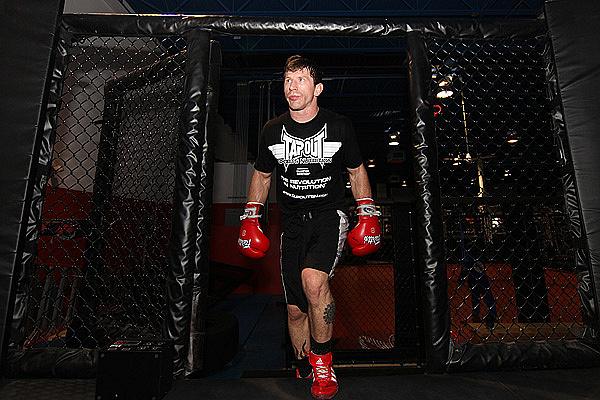Fighters at Work
Matt Beardmore May 24, 2010

Dave Mandel/Sherdog.com
Face it, your job sucks. Well, at least for many of us it does some of the time. If given the chance, we’d all change something about our workplaces. It could be that idiot that spends more time e-mailing us porn than working on the project that’s due this afternoon, or it could be our overbearing boss we’d like to tap out with an anaconda choke. And who wouldn’t like to see a couple extra zeroes on their paycheck?
Advertisement
Our favorite MMA stars face the same workplace frustrations that we do.
The daily grind
Waking up to the not-so-soothing sounds of an ear-piercing alarm clock then sitting in bumper-to-bumper traffic isn’t the best way to start the day, but millions of us keep spinning our wheels in this never ending rat race. Now imagine that same a.m. routine that leads you to the most unforgiving office.
Former WEC featherweight champ Mike Thomas Brown loves his job and he’s enjoying the most productive training sessions of his career, but he’s not wearing a smile to work every day.
“There are days when you don’t want to go to work at any job,” Brown says. “But in my job, when I don’t want to go to work, I go in and get punched in the face.
“It’s a lot of wear and tear on the body. Sometimes I wish I could get a time machine.”
Payday blues
Time travel sounds fun. But so does a tree that sprouts 100-dollar bills. With the uncertainty of today’s economy, working for the rest of our lives sadly doesn’t seem like the exception. A delayed retirement isn’t a fun prospect, but neither is having a career with such a short lifespan.
“I’m making good money right now, but I can’t keep fighting for another 10 or 15 years,” says Brown, 34. “A fighter’s career is very short, unless you’re a freak of nature like Randy Couture.”
Lightweight Aaron Riley is under contract with the UFC, but with the sometimes huge dollar differences between winning and losing, there’s still a financial uncertainty.
“You don’t know how to budget or think ahead on certain things,” Riley says. “That’s tough not to know. When you work another job, you have a good idea of your earning potential.”
The irritating co-worker
Whether you’re living comfortably off a six-figure salary or squeezing by ‘til your next payday, nobody can tolerate an annoying co-worker. The office gossip. The loud cell phone talker. The person that’s perpetually sick and/or late. When you’re trapped with people for eight hours a day, they’re bound to get on your nerves.
Fighters can feel the same animosity toward their workplace peers, but unlike us, they’re allowed to punch and kick these rude assholes.
“I have a humungous chip on my shoulder for people that got into the sport for the wrong reasons -- the girls, the TV time,” says lightweight Jorge Gurgel. “The growth of the sport provides a great lifestyle for some, but the bad part is the integrity of martial arts has been completely forgotten and watered down. It’s sad.”
While “The Ultimate Fighter” reality show has been home to some of the most immature and embarrassing behavior you can find on TV, Matt Serra kicked the door off the hinges when the UFC opened it for him in the fourth season of the program.
“TUF is an awesome opportunity for anyone to seize,” he says. “I seized that opportunity to the fullest.”
Yet as we’ve seen with the show’s alcohol meltdowns and limousine punches, not everyone that’s appeared on TUF has been committed to MMA.
“You’re gonna have knuckleheads anywhere,” Serra says.
Rules, rules and more rules
It’s OK to dislike or disagree with a co-worker, but we have to follow the rules to keep our jobs. As much as some of them would like free rein to let their fists and feet fly, fighters also face workplace restrictions.
“I love the idea of throwing two guys in a room and seeing who comes out,” Brown says. “That’s how I fell in love with the sport.”
But gone are the days of groin punches and throwing a 600-pound sumo wrestler against a man one-third his size. Middleweight Frank Shamrock says he wouldn't shy away from such a David-Goliath matchup.
“I could do without weigh-ins,” he says. “You’re there to fight, right? The whole weigh-in thing is weird to me. To me, cutting weight is a problem.”
Riley can relate. He makes his living at 155, but just getting to that number can be a battle.
“Cutting weight sucks,” he says.
Job satisfaction
While we’d all like to change something about our jobs, that doesn’t mean we don’t gain some level of satisfaction out of a good day at work.
“I love the hours. I love the way the job is,” Gurgel says.
“I really love what I do,” Brown agrees.
But how would you pay your bills if you weren’t fighting?
“I really don’t know,” Brown says, “but I guess I’d probably be punching the clock somewhere and working for the weekend.”
Aren’t we all?








